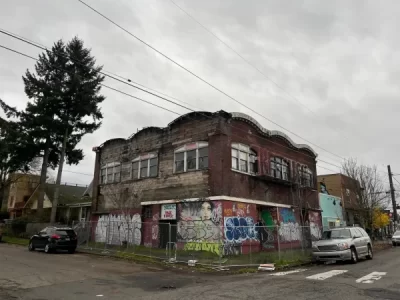
New Report: Taxing Land More Than Buildings Would Help Detroit Homeowners and Spur Development
By Will Jason, April 4, 2022
Reforming Detroit’s property tax system by taxing land at a higher rate than buildings would help to revive the local economy and reduce tax bills for nearly every homeowner, according to a new study from the nonprofit Lincoln Institute of Land Policy.
With the lowest property values of any large U.S. city and some of the highest property tax rates, Detroit is caught in a decades-long cycle of rising tax rates that still fail to generate enough revenue. In the absence of strong public services, high property taxes increase owner costs, reduce property values, and increase the costs of repair and redevelopment, creating a drag on economic recovery.
Like many economically distressed cities, Detroit copes with this challenge by offering generous tax abatements for new development and for some homeowners. Abatements relieve excess costs and temporarily raise property values, but only a small set of residents and new businesses qualify. This leaves high—sometimes destabilizing—tax bills in place for long-term owners. While high taxes remain on most homes and businesses, inclusive and lasting incentives for reinvestment are absent.
A higher tax rate for land than for structures—known as “split-rate” because there are two different tax rates—would address the problem more effectively and distribute the benefits more equitably.
The new study, Split-Rate Property Taxation in Detroit: Findings and Recommendations, finds that taxing land at five times the rate for buildings would result in lower tax bills for 96 percent of homeowners, with an average savings of about 18 percent. Under a revenue-neutral reform, tax savings would be fully offset by tax increases on vacant and underutilized property.
“By adopting a split-rate property tax, Detroit can make its tax system both more efficient and more equitable,” said John Anderson, an economist at the University of Nebraska, Lincoln, and lead author of the study. “Efficiency is enhanced by removing the tax-related barriers to capital improvements and development. Equity is enhanced by a reduction in taxes for the vast majority of residential homeowners.”
A split-rate tax increases the cost of holding vacant land and reduces the cost of developing it, or of renovating deteriorated buildings. Reduced tax burdens and accelerated investment lead to an average 12 percent increase in residential property value and a 20 percent increase for commercial property. In a supporting technical paper, the project team also found that the proposed 18 percent reduction in residential taxes would reduce residential tax foreclosures by at least 9 percent.
“Implementation of a split-rate tax in Detroit offers an opportunity to strengthen the property tax system by increasing efficiency, and reducing property tax inequities and tax foreclosure,” said Michigan State University economist Mark Skidmore, a co-author of the study.
The study analyzes data from municipalities in Pennsylvania that have implemented split-rate taxes, as well as real estate and property tax data from Detroit.
“If we are to continue the momentum of Detroit’s positive, equitable growth, we must transform our property tax structure to alleviate the burden on majority Black homeowners and local developers,” said Dave Blaszkiewicz, president and CEO of Invest Detroit. “This report provides a solution that accomplishes that while also disincentivizing blighted and underutilized properties that hinder Detroit’s growth.”
“With this analysis, Invest Detroit has elevated an equitable approach to taxation that can bring much-needed relief to tax-burdened Detroiters while encouraging investment and growth. This is a timely idea that addresses an urgent concern, and the highly regarded Lincoln Institute of Land Policy has now provided a solid framework for community discussions,” said Wendy Lewis Jackson, managing director of Kresge’s Detroit Program.
The team also produced three technical papers to support the study: “Assessment of Property Tax Reductions on Tax Delinquency, Tax Foreclosure, and Home Ownership”; “Split-Rate Taxation and Business Establishment Location Evidence from the Pennsylvania Experience”; and “Split-Rate Taxation: Impacts on Tax Base,” all published by the Lincoln Institute.
The study is available for download on the Lincoln Institute’s website: https://www.lincolninst.edu/publications/other/split-rate-property-taxation-in-detroit
Will Jason is the director of communications at the Lincoln Institute of Land Policy.
Comment:
As lead author of the new study, John Anderson’s statement on the economic rationale for land value taxation from the final report says it distinctly:
Unlike taxes on other property, a tax on land does not penalize new investment or distort investment decisions. Regardless of the level of taxation, the supply of land cannot be changed, and the highest use of the site is not altered. This neutrality is uncommon. Under a single-rate tax, the tax on an apartment building will be higher than the tax on a surface lot on the same site, effectively encouraging land to be used in surface lots and discouraging apartment construction. If both uses were taxed only on their land value, there would be no tax penalty to discourage apartment construction or other improvements on a vacant lot. The inelastic supply of land means that land taxes: (1) do not discourage more capital intensive development; (2) do not penalize renovations on existing investments; and (3) do not diminish investor interest. For local governments, this presents a huge potential advantage for tax productivity. Public finance scholars have long identified inelastic tax bases such as land as optimal sources of revenue because they can generate a given amount of revenue while minimizing distortions that are caused by taxation (Ramsey 1927).
The land value tax is unquestionably a pro-growth tax strategy. It has been a development driver in Pennsylvania; it can help rejuvenate Detroit; it can boost investment in housing and businesses in Oregon cities too.
Tom Gihring, Research Director
Common Ground OR-WA




